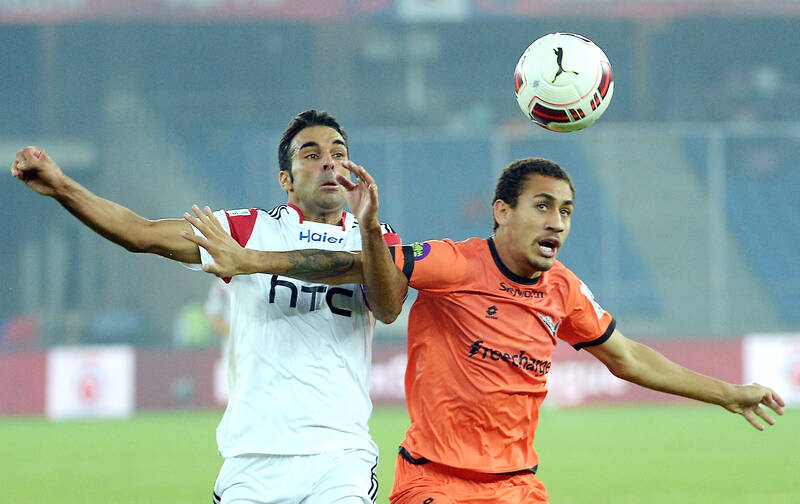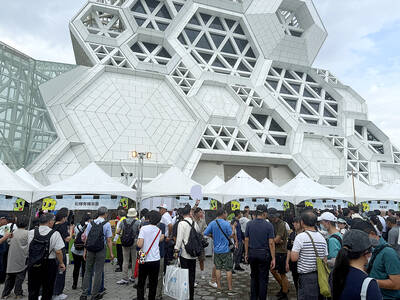Former FIFA president Sepp Blatter once called India a “sleeping giant” of football, but the sport is mired in fresh crisis in the country and faces problems from the top down to grassroots.
The men’s national team are without a coach and the Indian Super League (ISL) — India’s top competition — is in danger of collapsing over a dispute between the federation and its commercial partner.
“Everybody in the Indian football ecosystem is worried, hurt, scared about the uncertainty we are faced with,” Sunil Chhetri, the celebrated veteran striker, wrote on X about the fate of the ISL.

Photo: AFP
The former national skipper unwittingly summed up one of the issues facing Indian football when he came out of international retirement in March aged 40.
The striker has 95 goals for his country and is only behind Cristiano Ronaldo (138), Lionel Messi (112) and Ali Daei (108) in the all-time international scoring charts.
His best days are well behind him, but with no younger replacements coming through he returned to the national side.
India’s men are 133rd in the FIFA rankings — their lowest placing in nearly a decade — and have won just one of their last 16 matches.
They have never reached the World Cup and Spaniard Manolo Marquez stepped down this month as head coach after just one year and one win in eight games.
His last act was to oversee a 1-0 defeat in Asian Cup qualifying to Hong Kong, population 7.5 million to India’s 1.4 billion.
DISARRAY
The ISL is usually played between September and April.
But a rights agreement between the All India Football Federation (AIFF) and Football Sports Development Limited (FSDL), the company which runs the ISL, ends on Dec. 8 and is yet to be renewed.
The league is now paralyzed ahead of the new campaign and the uncertainty has affected over 5,000 players, coaches, staff and others.
National football team director and former captain Subrata Paul is confident the sport in India — a country obsessed with cricket — will come out stronger.
“Indian football, like any growing ecosystem, will face its share of challenges and transitions,” said Paul, regarded as one of India’s best-ever goalkeepers.
“I see this as a time to pause, reflect and refocus. Yes, the recent results and the uncertainty around the ISL are difficult for all of us who love the game, but I see a silver lining as well.
“It’s an opportunity to strengthen our foundation by investing in youth development, infrastructure and quality coaching.”
The franchise-based ISL started in 2014 as a league that brought global stars including Italy’s Alessandro Del Piero to India, and aimed to promote the game in a new avatar.
Bur rather than boom, the ISL has seen dwindling TV ratings and falling sponsor interest.
WENGER HELP AND HOPE
Football’s global bosses have long been keen to tap the potential that India has as the world’s most populous country.
Arsene Wenger, the former Arsenal manager and now FIFA’s chief of global football development, visited in 2023 to inaugurate an academy.
AIFF president Kalyan Chaubey — who is also a politician with the ruling Bharatiya Janata Party — last month met Wenger, who has backed India’s football development, particularly at grassroots level.
Chaubey said Wenger believes starting football at 13 years of age, as is the norm in India, is too late. Players should start by eight, he said.
While India have never reached the World Cup and again will be absent in North America next year, there has been modest success in the distant past.
India qualified for the Olympics four times between 1948 and 1960. At the 1956 Melbourne Games India came fourth after losing the bronze-medal match to Bulgaria.
Blatter in 2007 called India a “sleeping giant” — but it remains in a deep slumber.
’OWN BENFIT’
Football is a distant third in popularity in India after cricket and hockey, with the eastern city of Kolkata and the southern state of Kerala hotspots for the sport.
Compounding that, there has long been mismanagement by Indian football chiefs, said veteran sports journalist Jaydeep Basu.
“The fact that the team which was ranked 99 in September 2023 has come down to 133 basically shows poor management,” Basu said.
“There is a caucus working in the AIFF of two or three people who are running the show for their own benefit,” added Basu, who recently authored a book, Who stole my football?.
AFP has contacted the AIFF for comment.

Following the shock complete failure of all the recall votes against Chinese Nationalist Party (KMT) lawmakers on July 26, pan-blue supporters and the Chinese Communist Party (CCP) were giddy with victory. A notable exception was KMT Chairman Eric Chu (朱立倫), who knew better. At a press conference on July 29, he bowed deeply in gratitude to the voters and said the recalls were “not about which party won or lost, but were a great victory for the Taiwanese voters.” The entire recall process was a disaster for both the KMT and the Democratic Progressive Party (DPP). The only bright spot for

Water management is one of the most powerful forces shaping modern Taiwan’s landscapes and politics. Many of Taiwan’s township and county boundaries are defined by watersheds. The current course of the mighty Jhuoshuei River (濁水溪) was largely established by Japanese embankment building during the 1918-1923 period. Taoyuan is dotted with ponds constructed by settlers from China during the Qing period. Countless local civic actions have been driven by opposition to water projects. Last week something like 2,600mm of rain fell on southern Taiwan in seven days, peaking at over 2,800mm in Duona (多納) in Kaohsiung’s Maolin District (茂林), according to

Aug. 11 to Aug. 17 Those who never heard of architect Hsiu Tse-lan (修澤蘭) must have seen her work — on the reverse of the NT$100 bill is the Yangmingshan Zhongshan Hall (陽明山中山樓). Then-president Chiang Kai-shek (蔣介石) reportedly hand-picked her for the job and gave her just 13 months to complete it in time for the centennial of Republic of China founder Sun Yat-sen’s birth on Nov. 12, 1966. Another landmark project is Garden City (花園新城) in New Taipei City’s Sindian District (新店) — Taiwan’s first mountainside planned community, which Hsiu initiated in 1968. She was involved in every stage, from selecting

The latest edition of the Japan-Taiwan Fruit Festival took place in Kaohsiung on July 26 and 27. During the weekend, the dockside in front of the iconic Music Center was full of food stalls, and a stage welcomed performers. After the French-themed festival earlier in the summer, this is another example of Kaohsiung’s efforts to make the city more international. The event was originally initiated by the Japan-Taiwan Exchange Association in 2022. The goal was “to commemorate [the association’s] 50th anniversary and further strengthen the longstanding friendship between Japan and Taiwan,” says Kaohsiung Director-General of International Affairs Chang Yen-ching (張硯卿). “The first two editions